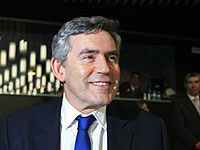Brown comes out smiling from "crunch summit"
 London - Under the unwritten rules of summit politics, everyone is a winner and failure is not an option.
London - Under the unwritten rules of summit politics, everyone is a winner and failure is not an option.
So it was no surprise that it was smiles all around as global leaders ended their one-day summit in London to fix the world economy.
"A new world order is emerging, a new progressive era of international cooperation," said summit host Gordon Brown.
He has reason to be pleased.
The summit turned out to be a success in that unity was maintained and cracks were papered over as key European Union (EU) nations pulled their weight on key issues of financial regulation and tax havens.
"In return for bowing to Germany and France, Brown has been able to link up with the magic of Obama," said one commentator Thursday.
In the functional surroundings of a large exhibition centre, it took leaders just seven hours to agree on emergency remedies for a global crisis that has affected all of them - with different degrees of severity.
For Brown, it was a "remarkable achievement" to get the leaders of more than 20 nations around one table to agree on joint measures.
"I have been talking about reshaping the world economy for 10 years, but coming together like this would never have been possible even two years ago," he said.
"By acting together to fulfil these pledges we will bring the world economy out of recession and prevent a crisis like this from recurring in the future."
After weeks of tireless campaigning and urgent appeals that the chance for saving the world economy must not be missed, Brown covered his exhaustion in layers of make-up.
Lucky for him, the strain of striving for unity had been sufficiently intense that almost everyone forgot his original aim - getting governments to pump more funds into national economies.
The atmosphere in the conference hall, according to participants, was jovial at times, even though the last-minute delivery of the final communique would suggest some hard bargaining.
There had been a good deal of good-humoured banter between the overwhelmingly male participants - with the exception of Germany's "Frau Nein" Angela Merkel and Argentina's Cristina Kirchner.
One picture showed Barack Obama, Dmitry Medvedev and Italy's Silvio Berlusconi giving a "thumbs up" in what one observer said resembled a "party mood."
However, body language was also important. After the Franco-German broadside at over-ambitious ideas for further fiscal programmes, Merkel could be seen sparing hardly a word - let alone a look in the eye - for Gordon Brown when she arrived for the Downing Street dinner on the eve of the summit.
Sarkozy, who had gone as far as threatening an "empty chair" policy, came late for the lavish dinner and left early, saying he needed to "freshen up" after enjoying canapes and champagne with Queen Elizabeth II.
The summit results, although impressive, clearly fall short of Brown's grand new bargain, which had focused on getting government to agree on new fiscal stimulus packages.
That goal was well and truly buried by the Franco-German intervention. That intervention was backed by many of the European Union's 27 members.
As Vince Cable, the British Liberals' finance spokesman, pointed out, the British leader is now no longer best placed to tell others what to do.
With the toxic debts of banks - in Britain and around the world - still an unknown quantity, there was little prospect of Brown being in a position any time soon to report an easing of frozen credit markets, which remain a major problem.
The BBC's economics editor, Robert Peston, a shrewd analyst of the economic scene, noted that Obama had urged "humility" with regards to defending the Anglo-American model.
This is not the time to advocate the Anglo-American method of banking," said Peston. (dpa)